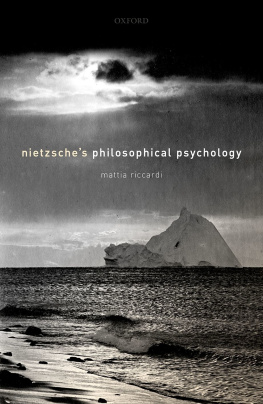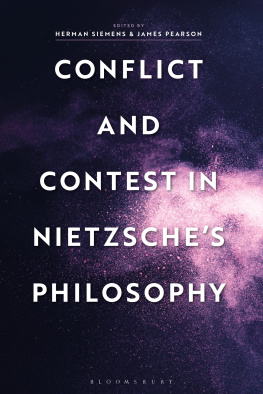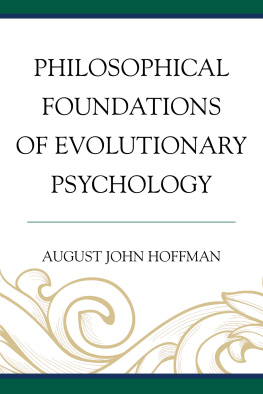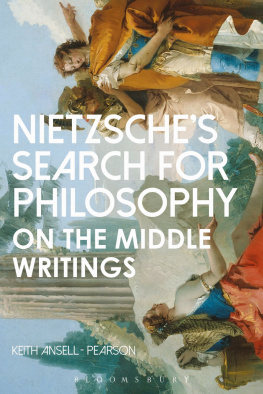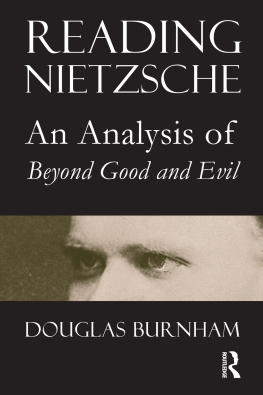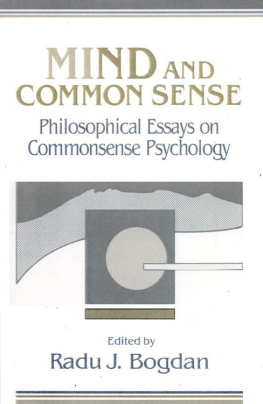Nietzsches Philosophical Psychology

Great Clarendon Street, Oxford, OX2 6DP, United Kingdom
Oxford University Press is a department of the University of Oxford. It furthers the Universitys objective of excellence in research, scholarship, and education by publishing worldwide. Oxford is a registered trade mark of Oxford University Press in the UK and in certain other countries
Mattia Riccardi 2021
The moral rights of the author have been asserted
First Edition published in 2021
Impression: 1
All rights reserved. No part of this publication may be reproduced, stored in a retrieval system, or transmitted, in any form or by any means, without the prior permission in writing of Oxford University Press, or as expressly permitted by law, by licence or under terms agreed with the appropriate reprographics rights organization. Enquiries concerning reproduction outside the scope of the above should be sent to the Rights Department, Oxford University Press, at the address above
You must not circulate this work in any other form and you must impose this same condition on any acquirer
Published in the United States of America by Oxford University Press
198 Madison Avenue, New York, NY 10016, United States of America
British Library Cataloguing in Publication Data
Data available
Library of Congress Control Number: 2021930038
ISBN 9780198803287
ebook ISBN 9780192524881
DOI: 10.1093/oso/9780198803287.001.0001
Printed and bound by
CPI Group (UK) Ltd, Croydon, CR0 4YY
Links to third party websites are provided by Oxford in good faith and for information only. Oxford disclaims any responsibility for the materials contained in any third party website referenced in this work.
I dedicate this book to my wife Brbara and to my children Vasco and Sara.
Acknowledgments
This book was conceived and written between Portowhere I was (and still am) part of the Mind, Language, and Action Group (MLAG) lead by Sofia Miguensand Bonnwhere I was Mitarbeiter at Michael Forsters Humboldt Chair. Many thanks to Sofia and Michael for being wonderful people to work with.
Over the years, I have been able to learn a lot by discussing my views about Nietzsche with Jessica Berry, Maria Joo Branco, Marco Brusotti, Maudemarie Clark, Joo Constncio, Manuel Dries, David Dudrick, Maria Cristina Fornari, Michael Forster, Chris Fowles, Ken Gemes, Pietro Gori, Andrew Huddleston, Chris Janaway, Peter Kail, Paul Katsafanas, Brian Leiter, Paul Loeb, Luca Lupo, Enrico Mller, Bernard Reginster, John Richardson, Paolo Stellino, and Benedetta Zavatta. (Apologies to anyone I am forgetting.)
Parts of the book draw on work already published elsewhere. incorporates materials from Nietzsche on Free Will, which appeared in M. Griffith, N. Levy & K. Timpe (eds.) Routledge Companion to Free Will (London: Routledge (2016): 364373). In all cases, I thank the publisher for permission to reprint such materials. (Gratitude to friends, colleagues, and audiences expressed on occasion of the original publication of these pieces obviously extends to this book.)
I am extremely grateful to two anonymous refereesone of whom was revealed to be Brian Leiterfor their detailed and insightful comments on the entire manuscript. Many thanks are also due to Chris Fowles for his comments on an earlier draft of and to Luca Corti for his comments on the final chapter.
I am very grateful to David Rosenthal for an extended and extraordinarily helpful email exchange on higher-order theories of consciousness.
I am very grateful also to Peter Momtchiloff for his encouraging guidance through the different book stages and for his patience.
A special thank is due to Brian Leiter, for his continuous support since we first met in Lisbon in 2012.
Mattia Riccardi
University of Porto / Institute of Philosophy
Contents
Nietzsches works are cited by using the conventional abbreviations listed below, followed by abbreviated title (if applicable) and section (Roman) and/or aphorism (Arabic) number (if applicable). Unpublished notes are quoted by indicating the notes year, its conventional number as established by the German critical edition, as well as the critical edition volume and the page number. When available, I use Kate Sturges translation in Writings from the Late Notebooks (Cambridge University Press, 2003), ed. by R. Bittner, thus adding references to that edition and to the relevant page number. In all other cases, the translation of Nietzsches unpublished notes is mine. For complete information about the other English translations I use, see the Bibliography. Translation changes are signalled in the text.
The Anti-Christ
Beyond Good and Evil
Birth of Tragedy
Daybreak
Ecce Homo
On the Genealogy of Morality
The Gay Science
Human, All Too Human
Kritische Studienausgabe
Writings from the Late Notebooks
Twilight of the Idols
Thus Spoke Zarathustra
In one of his notes, Georg Christoph Lichtenberg once wrote: Newton was able to separate the colours. Which name will the psychologist have who tells us what the causes of our actions are composed of? (Lichtenberg :51; see 1973 Heft C 303:213). We should not be surprised that Nietzsche felt drawn to these words, for the task of understanding how human agency works is a key part of his broader philosophical project centred on the critique of morality and on the revaluation of values. Among other things, Nietzsche surely saw himself as the philosopher saddled with the task of becoming the Newton of psychology envisaged by Lichtenberg.
In particular, Nietzsche shares with Lichtenberg the idea that psychology affords essential insights both into the working of the human mind and into the mechanisms of agency. At the end of BGE 23, which closes the theoretically dense Part of that book, he programmatically puts forward the demand that psychology again be recognized as queen of the sciences, and that the rest of the sciences exist to serve and prepare for it (BGE 23). As the very last sentence of that aphorism has it, from now on, psychology is again the path to the fundamental problems.
Another point that Nietzsche makes explicit in BGE 23 is the link between psychological inquiry and morality critique, as he affirms that making a certain psychological discoverythat the affects of hatred, envy, greed, and power-lust are elements that fundamentally and essentially need to be present in the total economy of lifealready means sailing straight over and away from morality. An even more straightforward link between psychology and morality is made in BGE 187, which concludes with Nietzsches famous claim to the effect that morality is just a sign language of the affectswhich I shall call the Semiotic Claim. At face value, at least, the view expressed by this claim amounts to a reduction of moral phenomena to psychological ones, for that of affect is a psychological notion. In fact, in another aphorism of the same work, Nietzsche explicitlyand somewhat surprisinglymakes a case in favour of rehabilitating the very notion of soul, which is of course what is traditionally conceived to be the proper object of psychology. There he writes:
there is absolutely no need to give up the soul itself, and relinquish one of the oldest and most venerable hypothesesas often happens with naturalists: given their clumsiness, they barely need to touch the soul to lose it. But the path lies open for new versions and sophistications of the soul hypothesisand concepts like the mortal soul and the soul as subject-multiplicity and the soul as a society constructed out of drives and affects want henceforth to have civil rights in the realm of science.(BGE 12)

